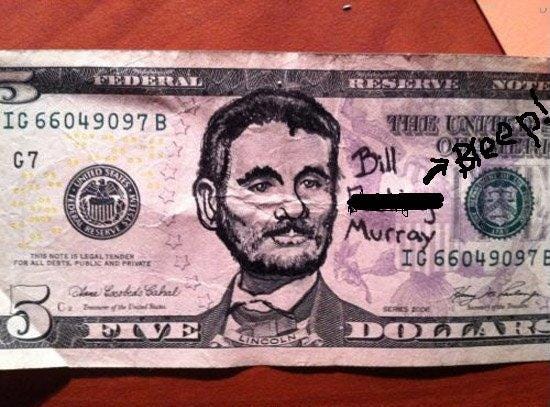
The Importance of Educating Yourself (Royalty Statements Part 2)
Hi All,
First, I apologize for this post getting up late today. It's been a little hectic over at New Leaf to wrap up things before the holidays, and since I'm the big cheese (big leaf? big tree? bah.) over there, a lot of things have to go through me. Including things like royalty statements, which I am discussing with you here today!
So I’m back to remind you how important it is as an author/illustrator to educate yourself in your own business. Like I said last time in Part 1 of this series: This is your money. Your business. Whether or not you have an agent, you should know how your business works.
Now let’s get to it.
Let's say you start your day business as usual, just like Bill Murray here:

Then you receive your mail and discover it contains your royalty statement (or statements).

Don't panic!! I've explained how to dive into the intimidating statements in my last post here. And to further help, I'm addressing the most frequently asked questions I receive about statements. Here are the top 5:
QUESTION: I work with more than one publisher and their statements look so different!

What do I do?
ANSWER: Publishers do not make this easy, I know. Each company has their own format, some more complicated than others. The only thing you can do is go through the steps I described in Part 1 for each statement and contract. I repeat: You will have to compare and read each and every contract and statement. I know it's boring work, but it's important work if you want to be an active participant in your own business. And if you're reading this post, that means you do!
QUESTION: Something doesn't look right on my statement and I've followed up with the publisher/company multiple times, but they aren't responding.

Do I have the right to audit them?
ANSWER: You do. In most contracts, there should be a clause that specifically addresses auditing. Typically, you have the right to audit one to two times per year, during normal business hours. And to go even further, contracts typically say who will cover the auditing cost. What it should say is that the cost will be covered by the party requesting the audit unless an accounting error is found that exceeds 5% or 10% (depending on the publisher) of what the author has made. However, if auditing is not addressed in your contract at all, that does not mean you can't audit. And in order to do so, I would suggest discussing with your agent or attorney about next steps at that point.
Whatever you do, auditing should not be something taken lightly. You should only go in that direction if you are fairly certain that there are some big mistakes being made and not being addressed by your publisher.
QUESTION: When you say “subrights splits”…what exactly does that mean?

How much money do I get?
ANSWER: "subrights splits" refer to the rights that the publisher retains and represents/sells on your behalf. Some examples of subrights that the publisher might retain are: book club, large print, first serial, second serial, audio, ebook, translation, etc. When a publisher retains these rights but does not produce them in-house, they will try to license these rights out.
For example, Random House retained your audio rights, but they are unable to publish them through Random House's audio arm (Listening Library). In this case, since they aren't publishing the audiobook in-house, they go on submission with those rights, just like you or your agent might do. Lucky day! They are able to license the audio rights out to Blackstone Audio. Go to the subrights section of your contract and find out what you receive of these monies. It could be listed like this: 50/50 or 70/30 (the split is always read as author/publisher unless otherwise stated in the contract). Or it might simply be listed as a percentage. For the sake of simplicity, let's say the author is set to receive 50% of this audio deal. That means you receive 50% of the net (the monies the publisher receives after any co-agent costs or taxes). For audio, there most likely won't be any extra costs, so if you are offered $1000 from Blackstone Audio, then $500 of that will go to you (or toward your advance). But for foreign rights, most publishers work with co-agents, who deduct their 10% commission off the top. And there are sometimes foreign taxes to comply with.
So if your translation split is also 50/50, and you receive a $1000 offer from X Foreign Publisher, this is how it's figured:
$1000 - $100 (10% co-agent comission) = $900
then $900 - $90 (10% foreign tax) = $810
then $800 - $35 (wire transfer fees) = $775
then $765 divided in half (50/50 split with the publisher) = $387.50
You receive $387.50 of a $1000 advance.
You should know that not all foreign countries charge extra taxes as long as your publisher supplies the correct tax paperwork. And some foreign territories charge an additional tax amount even if your publisher supplies the correct paperwork. This can all get very complicated, and it probably something I should address in a future Educating Yourself series post! (I'm on it.)
QUESTION: How do I know how much money I’ve made to-date?

ANSWER: There should be a section of your royalty statement that is labeled "Cumulative" or "Activity to Date"—somewhere at the bottom of that column will be your answer. If you can't find this column in your statement, please let me know in the comments and I will see what I can do to help!
QUESTION: In my first royalty statement, I sold a nice amount of books! But I just got my second royalty statement and it looks like a whole bunch were returned.

Why did this happen? Should I be concerned?
ANSWER: A large amount of returns is always jarring, but in order to figure out if you should be concerned, you should know what is normal:
Bookstores tend to over-order books. And after the first 4-6 months, they return a portion of the books they ordered based on the sales track of the book in their store. Which means that they always return something. This is normal. I've never worked on a book that published in physical format and got zero returns. Never. So if your first statement covers the first 4-6 months of your publication, then yes, it will look like you've sold a lot of books. And then the second statement covers the next 4-6 months in which it is normal for bookstores to make their returns, then yes—you will see a number that looks like a lot of returns.
But the numbers you see don't actually matter in terms of being concerned. What you really need to figure out is the sell-through rate of your book (i.e. how much of a percentage was returned). And in order to do that, you should ask your publisher how many books were shipped to bookstores vs how many were returned. In fact, your publisher might be able to just give you the sell-through rate and save you having to do the math.
So if you had 10,000 books returned in your second statement, that might seem like a heck of a lot. But if you find out they shipped 100,000 copies of the book...well, then that means 90% of your books sold (or are still being carried because bookstores believe they will sell). And that's awesome.
If you had 10,000 books returned in your second statement and find out that only 12,000 were shipped...that means that 83% of your books are being returned, which is not so awesome.
Keep in mind though, publishers make it their job to anticipate returns (which is why they hold a reserve against returns—discussed in Part 1), and they don't print 100,000 copies unless they have the bookstore orders to warrant it. So chances are very good that they've shipped a realistic number of books and that 83% of your books aren't returned. It's probably more like 20-40%. And that's more normal than you think.
As always, feel free to ask me questions in the comments! But be reminded:
I will NOT answer questions specific to your contract. I also will not read your contract for you.
Please remember to keep your contractual terms confidential.
If you need to consult on items specific to your contract, I suggest discussing these items with your agent, attorney or publisher directly.
I will not give accounting advice. For that, I suggest you find an accountant.







